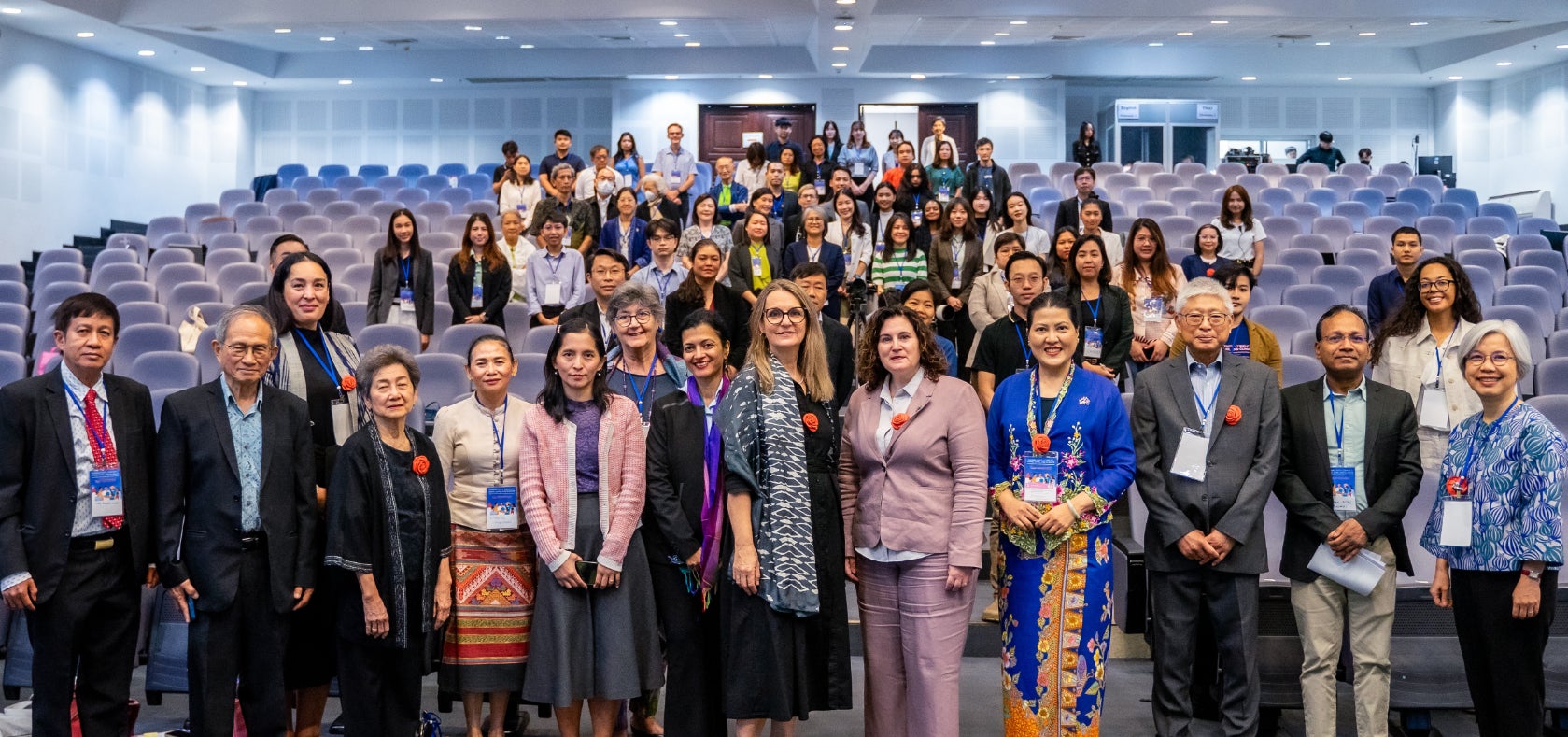Addressing gender-based violence, a focus at regional migration symposium
Date:

On December 17–18, 2024, Chulalongkorn University’s Asian Research Center for Migration (ARCM) convened the International Migrants Day Symposium in Bangkok, Thailand, under the theme: “Connectivity: Navigating Shared Responsibilities Under Growing Complexities.” The symposium brought together policymakers, civil society organisations, migrant workers, academics, and international organizations to discuss critical issues surrounding migration, including climate change, conflict, and gender-based violence (GBV).
UN Women and the International Labour Organization (ILO), in partnership with the European Union (EU) under the PROTECT Project, collaborated with the ASEAN Commission on the Promotion and Protection of the Rights of Women and Children (ACWC) to support the event. Their contributions included keynote interventions and an expert panel discussion highlighting coordinated responses to gender-based violence (GBV) and strategies to strengthen protection and support systems for migrant women and girls.
A study on public knowledge, attitudes, and practices toward women migrant workers, conducted by ILO and UN Women with support from the EU in 2023, was also presented. The findings emphasized the critical link between effective prevention and response to violence and the public awareness of issues faced by women migrant workers. Attitudes and practices toward protecting their human and labour rights were highlighted as key factors influencing both their vulnerability and access to support.
Speaking at the event, Dr. Audrey Anne-Rochelemagne, Deputy Head of cooperation Section at the Delegation of the European Union in Thailand, underscored the EU’s commitment to protecting the rights and ending violence against migrant women and children globally as the EU and its Member States provides 42 per cent of the world’s development assistance.
“The EU firmly believes that everyone has a critical role to create a safer environment for migrants, including women and children in all the migration process complexities. Through the PROTECT Project, we aim to strengthen coordination, enhance services, and ensure that migrants can live and work free from violence and exploitation,” she stated.
The EU-funded PROTECT Project is a €13 million initiative implemented by four UN agencies—ILO, UN Women, UNICEF, and UNODC—to safeguard the rights of women migrant workers and children in Southeast Asia.
In her remarks, Ms Christine Arab, UN Women Regional Director for Asia and the Pacific, emphasized the urgency of tackling gender-based violence, particularly in migration contexts.
“Women migrant workers are increasingly making independent choices to migrate for better opportunities, yet they face disproportionate risks of violence, harassment, and exploitation,” she noted. “With initiatives like PROTECT, we aim to create pathways for safe, orderly, and regular migration, where women and girls are valued, safe, and treated as equals.”
She commended ASEAN’s progress in developing survivor-centered approaches, including the ASEAN Guidelines for Standard Operating Procedures for a Coordinated Response to Violence Against Women and Girls. “Now is the time to turn these policy commitments into a lived reality,” she urged.
Spotlight on gender-based violence and migration: A coordinated response
The symposium’s panel, “Building a Safer Present and Future for Women and Girls: Exploring Coordinated Responses to Gender-Based Violence,” provided a platform for nuanced discussions on addressing GBV in migration contexts. Moderated by Nighina Azizov, EVAW Specialist at UN Women, the panel examined regional lessons, practical challenges, and promising strategies to strengthen coordinated responses.
Ms. Manivone Luangsombath of Lao PDR’s National Commission for the Advancement of Women and Mothers-Children (NCAWMC) shared experiences in advancing multi-sectoral GBV responses, emphasizing the importance of alignment between services.
ILO’s Ms. Ratna Mathai-Luke presented findings from the Safe and Fair project (the PROTECT project is a follow-up to the Safe and Fair project), shedding light on public perceptions and attitudes towards women and men migrant workers in Malaysia, Singapore, and Thailand. This highlighted the stigma and biases that exacerbate the risks faced by women migrant workers.
Further insights explored the challenges migrant women encounter in accessing GBV services in Thailand. Panelists discussed how fragmented systems, legal barriers, and insufficient outreach often leave survivors without timely support. Experts underscored that coordinated, survivor-centered responses are key to ensuring women receive the care and justice they deserve.
Participants emphasized the transformative role of peer networks. By fostering trust and providing critical linkages to services, these networks bridge gaps for women migrant workers navigating violence and exploitation.
“Women peer exchanges and capacity-building opportunities are vital for empowering women migrant workers. In cases of violence, we, as women leaders alongside civil society organizations such as MAP Foundation, are committed to standing with survivors, providing them with the support and resources they need to rebuild their lives,” said Ms. M Hkawn Mai, Representative of the Women Migrant Workers Peer Network and MAP Foundation.
The session revealed a clear consensus: stronger cross-sector collaboration and survivor-centered approaches are essential to tackling GBV among migrant populations. The PROTECT project emerged as a vital initiative in this effort, highlighting the need for evidence-based solutions and partnerships to address vulnerabilities and ensure migrant women’s safety and dignity.
The symposium underscored the need for a collaborative, multi-stakeholder approach to eliminate GBV, ensuring that women and girls can migrate safely and with dignity.
In photos
The panel was supported by the three-year project "Ensuring Decent Work and Reducing Vulnerabilities for Women and Children in the Context of Labour Migration in Southeast Asia (PROTECT)," running from 2024 to 2026. Funded by the EU, the project is jointly implemented by the ILO, UN Women, UNICEF, and UNODC to protect the rights of women and children in labor migration.
